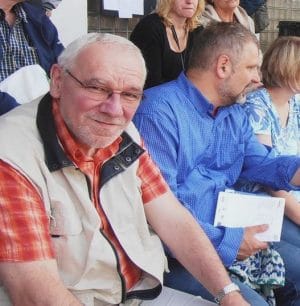
Oct 18, 2018 | Focolare Worldwide
The next event with the Friends of “Together for Europe” is going to be held in Prague, the land of the Hussites, the Prague Spring and the Velvet Revolution. The vast history of the Czech people will serve as the backdrop for the conversation among participants. It is a troubled history, marked by grand idealistic and spiritual re-awakenings and by a search for truth and justice that often ended in disappointment. Thus was the case of the three examples just mentioned: the Hussite Movement that began after the death of the priest Jan Hus, who was burned at the stake in 1415 and considered a martyr for the truth by his followers. Unfortunately, the wars that followed didn’t deal in truth, but in the lust for power and they completely devastated the country. Likewise, many centuries later, in 1968, the main actors in the Prague Spring, with the enthusiastic support of the whole country, wanted to install a Socialist regime with a human face, free of all the lies and cruelty of the recent past. Unfortunately, this hope was crushed under the wheels of armed tanks and ended in general resignation. Then came the Velvet Revolution in 1989, which many still remember. It was brought forward by its main protagonist, Vaclav Havel: “Love and the truth must win over the lies and the hate.” But no one expected the hard battle that followed: the spiritual values that were so strongly felt during the mass demonstrations in the public squares slowly dwindled as they were substituted with the pragmatism of the “technology of power.” The President of the Republic’s banner bears the words: “The Truth Wins.” However, two words were removed from the original version of that slogan: “The Truth of God Wins.” We’re sure that his truth will win before the end of the story.

Jiři Kratochvil
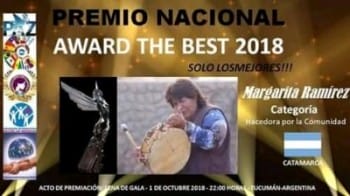
Oct 16, 2018 | Focolare Worldwide
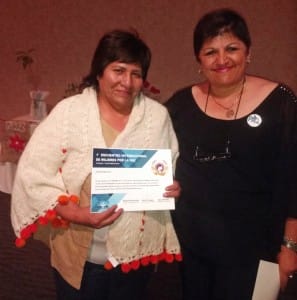 Many of our readers are familiar with the story of Margarita Ramirez De Moreno who comes from Santa Maria di Catamarca in the north east of Argentina. She is a descendent of Calchaquies Aborigines whose leader was Juan Calchaqui. These people were well known for their abilities in many forms of traditional crafts. Margarita certainly inherited an enterprising spirit and great talent in weaving from her ancestors. When she was young, she studied for a diploma at the “Aurora School” in her town: this institute is recognised by the Argentinian government for the outstanding contribution it makes to teaching about designs and traditional skills deriving from the “quechuan” culture. Later on in life, Margarita was unemployed but she did not give in to the personal challenges that she and many women like her faced but decided to open a spinning mill to provide thread for the looms in the school workshop. This enabled her to overcome discrimination and reclaim her cultural identity. On October 1st in Tucuman, Margarita received an award during the first international meeting of “Women for Peace” organised by the “World Federation of Grand Master Ladies”. This is an international association, found in many parts of the world that works with individuals, groups and foundations: its spirit facilitates women in establishing links of friendship, fraternity and support and enables them engage politically in initiatives promoting peace, security and protection.
Many of our readers are familiar with the story of Margarita Ramirez De Moreno who comes from Santa Maria di Catamarca in the north east of Argentina. She is a descendent of Calchaquies Aborigines whose leader was Juan Calchaqui. These people were well known for their abilities in many forms of traditional crafts. Margarita certainly inherited an enterprising spirit and great talent in weaving from her ancestors. When she was young, she studied for a diploma at the “Aurora School” in her town: this institute is recognised by the Argentinian government for the outstanding contribution it makes to teaching about designs and traditional skills deriving from the “quechuan” culture. Later on in life, Margarita was unemployed but she did not give in to the personal challenges that she and many women like her faced but decided to open a spinning mill to provide thread for the looms in the school workshop. This enabled her to overcome discrimination and reclaim her cultural identity. On October 1st in Tucuman, Margarita received an award during the first international meeting of “Women for Peace” organised by the “World Federation of Grand Master Ladies”. This is an international association, found in many parts of the world that works with individuals, groups and foundations: its spirit facilitates women in establishing links of friendship, fraternity and support and enables them engage politically in initiatives promoting peace, security and protection. 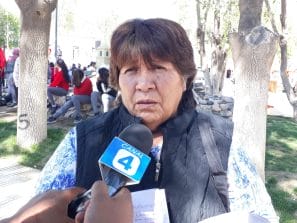 “There is no peace without justice and there is no justice without peace,” affirmed Mariela Martin Domenichelli, the co ordinator of the Latin American branch of the federation. “It’s important to listen to the women describing the situations in which they live so they can transform their ideas into political action that benefits the entire community.” The meeting wanted to showcase the positive contribution made by women in various fields of action. After the federation visited her area, Margarita was chosen as the person who symbolises the complete integration of women and the entire Aboriginal community to which they belong. Margarita – who now has seven children – said that it had not been easy to convince women in her area to work in spinning mills once again because they had suffered discrimination for so long. In addition, they had to walk long distances, crossing rivers to reach the mill because there was no transport. However, they gradually began to share the little they had: a bobbin, some wool or their skills in traditional crafts.
“There is no peace without justice and there is no justice without peace,” affirmed Mariela Martin Domenichelli, the co ordinator of the Latin American branch of the federation. “It’s important to listen to the women describing the situations in which they live so they can transform their ideas into political action that benefits the entire community.” The meeting wanted to showcase the positive contribution made by women in various fields of action. After the federation visited her area, Margarita was chosen as the person who symbolises the complete integration of women and the entire Aboriginal community to which they belong. Margarita – who now has seven children – said that it had not been easy to convince women in her area to work in spinning mills once again because they had suffered discrimination for so long. In addition, they had to walk long distances, crossing rivers to reach the mill because there was no transport. However, they gradually began to share the little they had: a bobbin, some wool or their skills in traditional crafts.  “The cost of machinery was a big problem,” Margarita said. “One day I was getting a lift and I told the driver about the difficulties we had. He told me that he knew how to make spinning machines and that we could pay him later, when we had the money. There were many difficulties but there were also signs that confirmed that what we were doing was right.” Margarita continued, “One day, when we were moving some fittings in the workshop, we found a picture of Mary, the Mother of God. This made a big impact on me and I felt that we should make a pact together to always love one another each day at work. We did this and soon after we received a donation that we used to buy better fittings and machinery.” We named our workshop “Tinku Kamayu” which in the local dialect means “Gathered together to work.” “We have found our identity and with that comes hope, growth, job opportunities for ourselves and others and the richness of our cultural origins. We feel we are useful – we don’t feel humiliated any longer. Other people appreciate us and want to hear our ideas.”
“The cost of machinery was a big problem,” Margarita said. “One day I was getting a lift and I told the driver about the difficulties we had. He told me that he knew how to make spinning machines and that we could pay him later, when we had the money. There were many difficulties but there were also signs that confirmed that what we were doing was right.” Margarita continued, “One day, when we were moving some fittings in the workshop, we found a picture of Mary, the Mother of God. This made a big impact on me and I felt that we should make a pact together to always love one another each day at work. We did this and soon after we received a donation that we used to buy better fittings and machinery.” We named our workshop “Tinku Kamayu” which in the local dialect means “Gathered together to work.” “We have found our identity and with that comes hope, growth, job opportunities for ourselves and others and the richness of our cultural origins. We feel we are useful – we don’t feel humiliated any longer. Other people appreciate us and want to hear our ideas.”
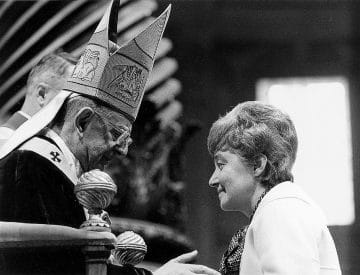
Oct 14, 2018 | Focolare Worldwide
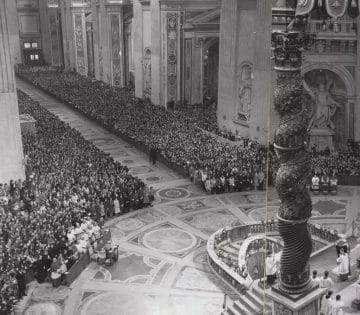 “YOUNG GEN! We welcome you with great joy as sons and daughters, brothers and sisters, friends! […] To search is really part of being a young person. Once the eyes of consciousness have opened on the world around us, curiosity is aroused in the souls of young people: they want to know, they want to try above anything else, and they want to attempt. Search, but for what? […] You, the young people of our times, you already have a negative answer, an almost rebellious answer in your hearts: we don’t want, you say, a world that presents itself to use like this! It’s a strange phenomenon: a world that offers you the most beautiful, the most perfect, the most enjoyable fruits of contemporary civilisation, doesn’t satisfy you, doesn’t please you. You benefit from the achievements, the comforts, the wonders placed at your disposal by modern progress. Yet a sense of criticism, protest and even nausea stops your search in this direction. This is a direction that takes you out of yourselves, an alienation because at the basis, it is a materialistic, hedonistic and selfish direction. It does not fully satisfy the soul. It does not completely resolve the important and personal problems of life. […] You have made a different choice. This is why you are called Gen, new generation. It is before all else a liberating choice, liberating from the passive conformism that affects so many young people of our times… At the basis of your psychology is a personal and sovereign act of free determination. The choice of Christ. […] Jesus Christ has crossed your path; and this is why you are here. Yes, the meeting with Him, Jesus Christ. But who is Jesus Christ? What an infinite question! […] Well: first, in Himself, Christ is the word of God made man; Christ is for us the Saviour of humanity. Two oceans: the Jesus Christ’s divinity, and Jesus Christ’s mission in the world. […] It seems to us that you, Focolarini, have faced this dual problem: Who is He, Christ? And Who is He, Christ, for us? And now the fire of light, enthusiasm, action, the gift of self and joy has been lit within you, and with a newfound inner fullness you have understood everything, God, yourselves, your life, people, our times, the central direction to take for the whole of your existence. Yes, this is the solution, this is the key, this is the formula, ancient and eternal, and when it is discovered, new. You have intuited it, and you have, rightfully, given your movement the definition of ‘New Generation’, Gen!
“YOUNG GEN! We welcome you with great joy as sons and daughters, brothers and sisters, friends! […] To search is really part of being a young person. Once the eyes of consciousness have opened on the world around us, curiosity is aroused in the souls of young people: they want to know, they want to try above anything else, and they want to attempt. Search, but for what? […] You, the young people of our times, you already have a negative answer, an almost rebellious answer in your hearts: we don’t want, you say, a world that presents itself to use like this! It’s a strange phenomenon: a world that offers you the most beautiful, the most perfect, the most enjoyable fruits of contemporary civilisation, doesn’t satisfy you, doesn’t please you. You benefit from the achievements, the comforts, the wonders placed at your disposal by modern progress. Yet a sense of criticism, protest and even nausea stops your search in this direction. This is a direction that takes you out of yourselves, an alienation because at the basis, it is a materialistic, hedonistic and selfish direction. It does not fully satisfy the soul. It does not completely resolve the important and personal problems of life. […] You have made a different choice. This is why you are called Gen, new generation. It is before all else a liberating choice, liberating from the passive conformism that affects so many young people of our times… At the basis of your psychology is a personal and sovereign act of free determination. The choice of Christ. […] Jesus Christ has crossed your path; and this is why you are here. Yes, the meeting with Him, Jesus Christ. But who is Jesus Christ? What an infinite question! […] Well: first, in Himself, Christ is the word of God made man; Christ is for us the Saviour of humanity. Two oceans: the Jesus Christ’s divinity, and Jesus Christ’s mission in the world. […] It seems to us that you, Focolarini, have faced this dual problem: Who is He, Christ? And Who is He, Christ, for us? And now the fire of light, enthusiasm, action, the gift of self and joy has been lit within you, and with a newfound inner fullness you have understood everything, God, yourselves, your life, people, our times, the central direction to take for the whole of your existence. Yes, this is the solution, this is the key, this is the formula, ancient and eternal, and when it is discovered, new. You have intuited it, and you have, rightfully, given your movement the definition of ‘New Generation’, Gen!  So, dear Young Gen! Encounter, know, love, follow Jesus Christ! This is your program. This is the synthesis of your spirituality which you, by celebrating the Jubilee of the Holy Year, wish to reaffirm in your consciences and translate into life. With two conclusions. The first, in order to condense the secret of your Movement in a central and mature thought try always to have Jesus as Teacher. And then the second conclusion, that we likewise listen to the words spoken by Jesus the Teacher: ‘You are all brothers and sisters’. Have the wisdom and courage to reach this conclusion which is the root of Christian social teaching. It is often disconcerting to observe how many claiming to be those who follow the Gospel are incapable of deducing from the Gospel itself a social teaching based on love. […] You, the new Generation, are faithful and coherent. If you have chosen Christ as your Master, have faith in Him and in the Church which leads and presents Him to you. Demonstrate with actions the realizing force of charity and social love, established by the Master. It will be an experience, yes, a new one, one which generates a better and more just world. It will be a strong experience; demanding resistance, sacrifice, maybe even heroism; it will demand that you too are the robust and willing Cyrenians who offer their own backs to support the Cross of Jesus. Yes, you should also suffer with Him, as Him, for Him! But do not be afraid, Gen! Be sure! You will have operated your salvation and that of our modern world. And just as you are today, you will always be good and happy!”
So, dear Young Gen! Encounter, know, love, follow Jesus Christ! This is your program. This is the synthesis of your spirituality which you, by celebrating the Jubilee of the Holy Year, wish to reaffirm in your consciences and translate into life. With two conclusions. The first, in order to condense the secret of your Movement in a central and mature thought try always to have Jesus as Teacher. And then the second conclusion, that we likewise listen to the words spoken by Jesus the Teacher: ‘You are all brothers and sisters’. Have the wisdom and courage to reach this conclusion which is the root of Christian social teaching. It is often disconcerting to observe how many claiming to be those who follow the Gospel are incapable of deducing from the Gospel itself a social teaching based on love. […] You, the new Generation, are faithful and coherent. If you have chosen Christ as your Master, have faith in Him and in the Church which leads and presents Him to you. Demonstrate with actions the realizing force of charity and social love, established by the Master. It will be an experience, yes, a new one, one which generates a better and more just world. It will be a strong experience; demanding resistance, sacrifice, maybe even heroism; it will demand that you too are the robust and willing Cyrenians who offer their own backs to support the Cross of Jesus. Yes, you should also suffer with Him, as Him, for Him! But do not be afraid, Gen! Be sure! You will have operated your salvation and that of our modern world. And just as you are today, you will always be good and happy!”
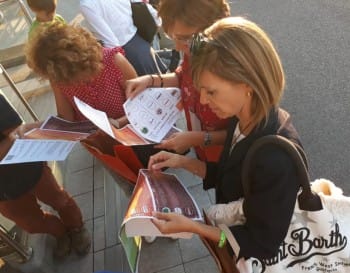
Oct 11, 2018 | Focolare Worldwide
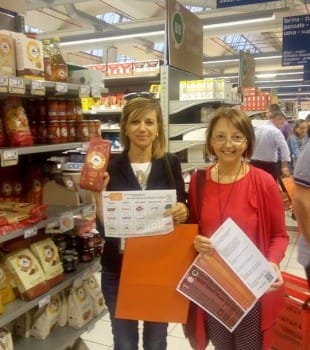 Put the heads of a group of teenagers together having taken part in the recent annual workshop in Loppiano, and one keyword emerges: “participation.” In view of this, the Youth Section of the Economy of Communion (EoC) launched on the social network and among their friends a workshop called “Inside the LABel.” At the conclusion of the day which the Bonfanti Industrial Park had dedicated to the topics of economy and work, the participants left the meeting hall and the filled cars that were waiting to take them to the nearby Coop Supermarket in the town of Figline. A table was set up at the entrance of the superstore along with ballot boxes. Then, an innovative experiment began that lasted for two hours, a genuine voting campaign. The five candidates were: pasta, coffee, chocolate, canned tuna and oranges. “But what does democracy have to do with a supermarket?” someone asked. “It does, it has a lot to do…” said one of the organizers named Chiara. “Using our wallets, we exert our “buying power.” The “vote with our wallet” is just one example of civil responsibility. Whenever we buy a product we express a preference, we support the work of a business that produces the product, a particular business model, a mission, a series of internal processes, a certain type of managing of relationships with employees and providers, a certain type of impact on the environment.” “After a meeting with Luigino Buni on the relationship between democracy and market,” says Stefania, “we worked for nearly three months examining the ‘vision’ and ‘mission’ of small and large brands at around 20 businesses. Following indicators such as transparency, production chain, respect for the environment, social responsibility, corporate form and legal record, we gathered data and information that were published on the web.”
Put the heads of a group of teenagers together having taken part in the recent annual workshop in Loppiano, and one keyword emerges: “participation.” In view of this, the Youth Section of the Economy of Communion (EoC) launched on the social network and among their friends a workshop called “Inside the LABel.” At the conclusion of the day which the Bonfanti Industrial Park had dedicated to the topics of economy and work, the participants left the meeting hall and the filled cars that were waiting to take them to the nearby Coop Supermarket in the town of Figline. A table was set up at the entrance of the superstore along with ballot boxes. Then, an innovative experiment began that lasted for two hours, a genuine voting campaign. The five candidates were: pasta, coffee, chocolate, canned tuna and oranges. “But what does democracy have to do with a supermarket?” someone asked. “It does, it has a lot to do…” said one of the organizers named Chiara. “Using our wallets, we exert our “buying power.” The “vote with our wallet” is just one example of civil responsibility. Whenever we buy a product we express a preference, we support the work of a business that produces the product, a particular business model, a mission, a series of internal processes, a certain type of managing of relationships with employees and providers, a certain type of impact on the environment.” “After a meeting with Luigino Buni on the relationship between democracy and market,” says Stefania, “we worked for nearly three months examining the ‘vision’ and ‘mission’ of small and large brands at around 20 businesses. Following indicators such as transparency, production chain, respect for the environment, social responsibility, corporate form and legal record, we gathered data and information that were published on the web.”  “It was an interesting and enriching challenge,” continues Francesca, “which revealed a complexity of ethics, values and conventions that influence our daily purchases. As we moved ahead and our awareness increased, we came up with a project that we could share. The role of civil responsibility, being critical consumers and becoming aware that one’s own purchases, can influence the behaviour of large and small businesses. This is why we came up with a project that we call “Inside the Label.” This year’s LoppianoLab seemed like the opportunity to present it.” Andrea interrupts: “Based on the materials that were collected, we chose three products from different brands for each category, trying to highlight the nuances in terms of transparency, pricing, commitment and quality. We left it to the participants to choose the products they would buy, after having shared with them the tools for reading the labels also for “moral calories” and “ethical sugars.” It was a project that took nothing for granted, but stuck to reality.
“It was an interesting and enriching challenge,” continues Francesca, “which revealed a complexity of ethics, values and conventions that influence our daily purchases. As we moved ahead and our awareness increased, we came up with a project that we could share. The role of civil responsibility, being critical consumers and becoming aware that one’s own purchases, can influence the behaviour of large and small businesses. This is why we came up with a project that we call “Inside the Label.” This year’s LoppianoLab seemed like the opportunity to present it.” Andrea interrupts: “Based on the materials that were collected, we chose three products from different brands for each category, trying to highlight the nuances in terms of transparency, pricing, commitment and quality. We left it to the participants to choose the products they would buy, after having shared with them the tools for reading the labels also for “moral calories” and “ethical sugars.” It was a project that took nothing for granted, but stuck to reality.  Like every respectable voting campaign, the votes are anticipated by a talk show prepared and broadcast by the organizers at the entrance of the Coop. Each of them presents his or her own candidate, along with comments from a citizen-consumer. Then, the participants are provided with a shopping sack, a voting card and the addresses of a web site which was created for the occasion. The aisles of the Co-op, with its usual Saturday family shoppers, were also filled with shoppers who were carefully re-reading labels. After paying the cashier, the final democratic duty of political responsibility was to mark an “X” beside the products one had chosen and to drop it into the ballot box. Then there were interviews, photos, surveys and data collection. There were more than a hundred voters, but far many more things to think about. In the meantime, the Italian Constituent of the EoC is already planning a second “Inside the LABel” event at Castel Gandolfo, Italy, on the occasion of the International Prophetic Economy Event (November 2-4). Deep down, we’re all change-makers. Source: EdC online
Like every respectable voting campaign, the votes are anticipated by a talk show prepared and broadcast by the organizers at the entrance of the Coop. Each of them presents his or her own candidate, along with comments from a citizen-consumer. Then, the participants are provided with a shopping sack, a voting card and the addresses of a web site which was created for the occasion. The aisles of the Co-op, with its usual Saturday family shoppers, were also filled with shoppers who were carefully re-reading labels. After paying the cashier, the final democratic duty of political responsibility was to mark an “X” beside the products one had chosen and to drop it into the ballot box. Then there were interviews, photos, surveys and data collection. There were more than a hundred voters, but far many more things to think about. In the meantime, the Italian Constituent of the EoC is already planning a second “Inside the LABel” event at Castel Gandolfo, Italy, on the occasion of the International Prophetic Economy Event (November 2-4). Deep down, we’re all change-makers. Source: EdC online
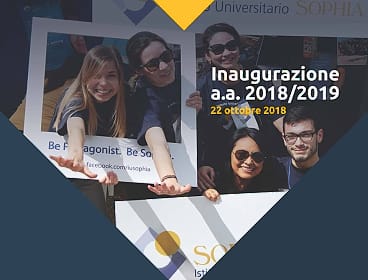
Oct 11, 2018 | Focolare Worldwide
 Sophia University Institute of Loppiano will celebrate the opening of the 11th academic year on October 22, 2018, at 17:00 in the Auditorium. Following the greetings from the Grand Chancellor, Cardinal Giuseppe Betori, Archbishop of Florence, Italy; Vice-Grand Chancellor Dr Maria Voce, president of the Work of Mary; and Dr Egidio Sgulloni, president of the Foundation for Sophia, there will be a panel discussion “On the net: Sophia and the University of Perugia,” with interventions by Dr Piero Coda, president of Sophia University Institute, Dr Franco Moriconi, Grand Rector of the Universty of Perugia Studies, and of Dr Mary Elisabeth Trini, double graduate with a double title IU Sophia-University of Perugia. It will conclude with a roundtable titled “The Challenge of Fraternity In Politics and Law,” with a presentation by the “Sophia Center for Researcih on Politics and Human Rights.” Professors Antonio Maria Baggio (IUS), Adriana Cosseddu (University of Sassari) and Antonio Marques Prieto (University of Malaga) will also make presentations.
Sophia University Institute of Loppiano will celebrate the opening of the 11th academic year on October 22, 2018, at 17:00 in the Auditorium. Following the greetings from the Grand Chancellor, Cardinal Giuseppe Betori, Archbishop of Florence, Italy; Vice-Grand Chancellor Dr Maria Voce, president of the Work of Mary; and Dr Egidio Sgulloni, president of the Foundation for Sophia, there will be a panel discussion “On the net: Sophia and the University of Perugia,” with interventions by Dr Piero Coda, president of Sophia University Institute, Dr Franco Moriconi, Grand Rector of the Universty of Perugia Studies, and of Dr Mary Elisabeth Trini, double graduate with a double title IU Sophia-University of Perugia. It will conclude with a roundtable titled “The Challenge of Fraternity In Politics and Law,” with a presentation by the “Sophia Center for Researcih on Politics and Human Rights.” Professors Antonio Maria Baggio (IUS), Adriana Cosseddu (University of Sassari) and Antonio Marques Prieto (University of Malaga) will also make presentations.
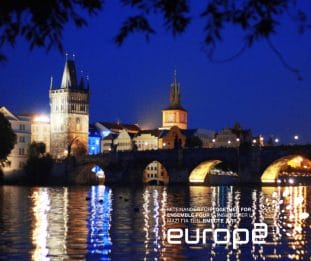
Oct 10, 2018 | Focolare Worldwide
 The great history of Central Europe, in particular of the Czech nation will serve as a backdrop for a new stage in the journey of Together for Europe, which promotes dialogue between divergent cultural and political identities. In November 2017 the European meeting of Friends of Together for Europe took place in Vienna, a bridge between Eastern and Western Europe. This year, we will have the opportunity to take another step to the very heart of Central Eastern Europe – Prague, with a singular desire to face challenges, prejudices and fears which weigh on the collective conscience of EU member states and beyond. Through the life of the Gospel, nourished and enlightened by the presence of Christ in the Christian communities, we wish to witness to the fact that the path towards Europe as a House of Nations and a Family of Peoples is not a utopia. The enduring legacy of the “Velvet Revolution” On 17th November, the Czech Republic commemorates the anniversary of the “Velvet Revolution” (so called due to its peaceful nature) which transformed the Czech Republic into a co-protagonist for the ongoing process of European reunification. The presence of the Friends of Together for Europe in Prague on this very day, urges us to renew our shared commitment: to bring to a post-secular culture the spirit of Christian Humanism, and in so doing contribute to building a more united Europe. The renowned Czech Philosopher and Theologian Tomas Halik, friend of the late Vaclav Havel, Jaroslav Sebek of the Historical Czech Academy of Science, and Pavel Fischer an emerging Czech politician, together with leaders and representatives of different Movements, Communities and Associations will be present. Their contributions will reinforce the daring objective of this meeting: to recall a Europe of hope and promise, a Europe which stems from a rich heritage of ethnic, social and cultural diversity and calls out for communion and dialogue. In this way, the Prague event will become a fundamental phase of Together for Europe which continues its commitment for a more united, brotherly and just Europe. It will also be a unique opportunity to prepare together for the upcoming elections for the European Parliament. The meeting will conclude with an open evening, in which Movements and Communities from different churches and which are present in the Czech Republic will be represented. Address: Mariapolis Centre, Mladoboleslavská 667, 190 17 Prague 9 – Vinoř, Czech Republic – Tel. +420 286 007 711; Email: cmpraha@espol.cz; www.centrummariapoli.cz Source: Together for Europe Foto: Canva
The great history of Central Europe, in particular of the Czech nation will serve as a backdrop for a new stage in the journey of Together for Europe, which promotes dialogue between divergent cultural and political identities. In November 2017 the European meeting of Friends of Together for Europe took place in Vienna, a bridge between Eastern and Western Europe. This year, we will have the opportunity to take another step to the very heart of Central Eastern Europe – Prague, with a singular desire to face challenges, prejudices and fears which weigh on the collective conscience of EU member states and beyond. Through the life of the Gospel, nourished and enlightened by the presence of Christ in the Christian communities, we wish to witness to the fact that the path towards Europe as a House of Nations and a Family of Peoples is not a utopia. The enduring legacy of the “Velvet Revolution” On 17th November, the Czech Republic commemorates the anniversary of the “Velvet Revolution” (so called due to its peaceful nature) which transformed the Czech Republic into a co-protagonist for the ongoing process of European reunification. The presence of the Friends of Together for Europe in Prague on this very day, urges us to renew our shared commitment: to bring to a post-secular culture the spirit of Christian Humanism, and in so doing contribute to building a more united Europe. The renowned Czech Philosopher and Theologian Tomas Halik, friend of the late Vaclav Havel, Jaroslav Sebek of the Historical Czech Academy of Science, and Pavel Fischer an emerging Czech politician, together with leaders and representatives of different Movements, Communities and Associations will be present. Their contributions will reinforce the daring objective of this meeting: to recall a Europe of hope and promise, a Europe which stems from a rich heritage of ethnic, social and cultural diversity and calls out for communion and dialogue. In this way, the Prague event will become a fundamental phase of Together for Europe which continues its commitment for a more united, brotherly and just Europe. It will also be a unique opportunity to prepare together for the upcoming elections for the European Parliament. The meeting will conclude with an open evening, in which Movements and Communities from different churches and which are present in the Czech Republic will be represented. Address: Mariapolis Centre, Mladoboleslavská 667, 190 17 Prague 9 – Vinoř, Czech Republic – Tel. +420 286 007 711; Email: cmpraha@espol.cz; www.centrummariapoli.cz Source: Together for Europe Foto: Canva




 Many of our readers are familiar with the story of Margarita Ramirez De Moreno who comes from Santa Maria di Catamarca in the north east of Argentina. She is a descendent of Calchaquies Aborigines whose leader was Juan Calchaqui. These people were well known for their abilities in many forms of traditional crafts. Margarita certainly inherited an enterprising spirit and great talent in weaving from her ancestors. When she was young, she studied for a diploma at the “Aurora School” in her town: this institute is recognised by the Argentinian government for the outstanding contribution it makes to teaching about designs and traditional skills deriving from the “quechuan” culture. Later on in life, Margarita was unemployed but she did not give in to the personal challenges that she and many women like her faced but decided to open a spinning mill to provide thread for the looms in the school workshop. This enabled her to overcome discrimination and reclaim her cultural identity. On October 1st in Tucuman, Margarita received an award during the first international meeting of “Women for Peace” organised by the “World Federation of Grand Master Ladies”. This is an international association, found in many parts of the world that works with individuals, groups and foundations: its spirit facilitates women in establishing links of friendship, fraternity and support and enables them engage politically in initiatives promoting peace, security and protection.
Many of our readers are familiar with the story of Margarita Ramirez De Moreno who comes from Santa Maria di Catamarca in the north east of Argentina. She is a descendent of Calchaquies Aborigines whose leader was Juan Calchaqui. These people were well known for their abilities in many forms of traditional crafts. Margarita certainly inherited an enterprising spirit and great talent in weaving from her ancestors. When she was young, she studied for a diploma at the “Aurora School” in her town: this institute is recognised by the Argentinian government for the outstanding contribution it makes to teaching about designs and traditional skills deriving from the “quechuan” culture. Later on in life, Margarita was unemployed but she did not give in to the personal challenges that she and many women like her faced but decided to open a spinning mill to provide thread for the looms in the school workshop. This enabled her to overcome discrimination and reclaim her cultural identity. On October 1st in Tucuman, Margarita received an award during the first international meeting of “Women for Peace” organised by the “World Federation of Grand Master Ladies”. This is an international association, found in many parts of the world that works with individuals, groups and foundations: its spirit facilitates women in establishing links of friendship, fraternity and support and enables them engage politically in initiatives promoting peace, security and protection.  “There is no peace without justice and there is no justice without peace,” affirmed Mariela Martin Domenichelli, the co ordinator of the Latin American branch of the federation. “It’s important to listen to the women describing the situations in which they live so they can transform their ideas into political action that benefits the entire community.” The meeting wanted to showcase the positive contribution made by women in various fields of action. After the federation visited her area, Margarita was chosen as the person who symbolises the complete integration of women and the entire Aboriginal community to which they belong. Margarita – who now has seven children – said that it had not been easy to convince women in her area to work in spinning mills once again because they had suffered discrimination for so long. In addition, they had to walk long distances, crossing rivers to reach the mill because there was no transport. However, they gradually began to share the little they had: a bobbin, some wool or their skills in traditional crafts.
“There is no peace without justice and there is no justice without peace,” affirmed Mariela Martin Domenichelli, the co ordinator of the Latin American branch of the federation. “It’s important to listen to the women describing the situations in which they live so they can transform their ideas into political action that benefits the entire community.” The meeting wanted to showcase the positive contribution made by women in various fields of action. After the federation visited her area, Margarita was chosen as the person who symbolises the complete integration of women and the entire Aboriginal community to which they belong. Margarita – who now has seven children – said that it had not been easy to convince women in her area to work in spinning mills once again because they had suffered discrimination for so long. In addition, they had to walk long distances, crossing rivers to reach the mill because there was no transport. However, they gradually began to share the little they had: a bobbin, some wool or their skills in traditional crafts. 


 Put the heads of a group of teenagers together having taken part in the recent annual workshop in Loppiano, and one keyword emerges: “participation.” In view of this, the Youth Section of the Economy of Communion (EoC) launched on the social network and among their friends a workshop called “Inside the LABel.” At the conclusion of the day which the Bonfanti Industrial Park had dedicated to the topics of economy and work, the participants left the meeting hall and the filled cars that were waiting to take them to the nearby Coop Supermarket in the town of Figline. A table was set up at the entrance of the superstore along with ballot boxes. Then, an innovative experiment began that lasted for two hours, a genuine voting campaign. The five candidates were: pasta, coffee, chocolate, canned tuna and oranges. “But what does democracy have to do with a supermarket?” someone asked. “It does, it has a lot to do…” said one of the organizers named Chiara. “Using our wallets, we exert our “buying power.” The “vote with our wallet” is just one example of civil responsibility. Whenever we buy a product we express a preference, we support the work of a business that produces the product, a particular business model, a mission, a series of internal processes, a certain type of managing of relationships with employees and providers, a certain type of impact on the environment.” “After a meeting with Luigino Buni on the relationship between democracy and market,” says Stefania, “we worked for nearly three months examining the ‘vision’ and ‘mission’ of small and large brands at around 20 businesses. Following indicators such as transparency, production chain, respect for the environment, social responsibility, corporate form and legal record, we gathered data and information that were published on the web.”
Put the heads of a group of teenagers together having taken part in the recent annual workshop in Loppiano, and one keyword emerges: “participation.” In view of this, the Youth Section of the Economy of Communion (EoC) launched on the social network and among their friends a workshop called “Inside the LABel.” At the conclusion of the day which the Bonfanti Industrial Park had dedicated to the topics of economy and work, the participants left the meeting hall and the filled cars that were waiting to take them to the nearby Coop Supermarket in the town of Figline. A table was set up at the entrance of the superstore along with ballot boxes. Then, an innovative experiment began that lasted for two hours, a genuine voting campaign. The five candidates were: pasta, coffee, chocolate, canned tuna and oranges. “But what does democracy have to do with a supermarket?” someone asked. “It does, it has a lot to do…” said one of the organizers named Chiara. “Using our wallets, we exert our “buying power.” The “vote with our wallet” is just one example of civil responsibility. Whenever we buy a product we express a preference, we support the work of a business that produces the product, a particular business model, a mission, a series of internal processes, a certain type of managing of relationships with employees and providers, a certain type of impact on the environment.” “After a meeting with Luigino Buni on the relationship between democracy and market,” says Stefania, “we worked for nearly three months examining the ‘vision’ and ‘mission’ of small and large brands at around 20 businesses. Following indicators such as transparency, production chain, respect for the environment, social responsibility, corporate form and legal record, we gathered data and information that were published on the web.”  “It was an interesting and enriching challenge,” continues Francesca, “which revealed a complexity of ethics, values and conventions that influence our daily purchases. As we moved ahead and our awareness increased, we came up with a project that we could share. The role of civil responsibility, being critical consumers and becoming aware that one’s own purchases, can influence the behaviour of large and small businesses. This is why we came up with a project that we call “Inside the Label.” This year’s LoppianoLab seemed like the opportunity to present it.” Andrea interrupts: “Based on the materials that were collected, we chose three products from different brands for each category, trying to highlight the nuances in terms of transparency, pricing, commitment and quality. We left it to the participants to choose the products they would buy, after having shared with them the tools for reading the labels also for “moral calories” and “ethical sugars.” It was a project that took nothing for granted, but stuck to reality.
“It was an interesting and enriching challenge,” continues Francesca, “which revealed a complexity of ethics, values and conventions that influence our daily purchases. As we moved ahead and our awareness increased, we came up with a project that we could share. The role of civil responsibility, being critical consumers and becoming aware that one’s own purchases, can influence the behaviour of large and small businesses. This is why we came up with a project that we call “Inside the Label.” This year’s LoppianoLab seemed like the opportunity to present it.” Andrea interrupts: “Based on the materials that were collected, we chose three products from different brands for each category, trying to highlight the nuances in terms of transparency, pricing, commitment and quality. We left it to the participants to choose the products they would buy, after having shared with them the tools for reading the labels also for “moral calories” and “ethical sugars.” It was a project that took nothing for granted, but stuck to reality. 
